could have done 用法详解
couldhavedone的意思及用法
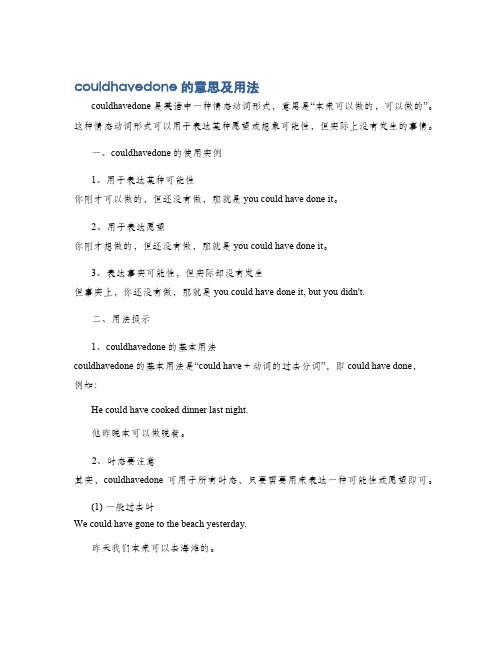
couldhavedone的意思及用法couldhavedone是英语中一种情态动词形式,意思是“本来可以做的,可以做的”。
这种情态动词形式可以用于表达某种愿望或想象可能性,但实际上没有发生的事情。
一、couldhavedone的使用实例1、用于表达某种可能性你刚才可以做的,但还没有做,那就是you could have done it。
2、用于表达愿望你刚才想做的,但还没有做,那就是you could have done it。
3、表达事实可能性,但实际却没有发生但事实上,你还没有做,那就是you could have done it, but you didn't.二、用法提示1、couldhavedone的基本用法couldhavedone的基本用法是“could have + 动词的过去分词”,即could have done,例如:He could have cooked dinner last night.他昨晚本可以做晚餐。
2、时态要注意其实,couldhavedone可用于所有时态,只要需要用来表达一种可能性或愿望即可。
(1) 一般过去时We could have gone to the beach yesterday.昨天我们本来可以去海滩的。
(2) 现在完成时She could have done her homework already.她本来可以已经做完作业了。
(3) 过去完成时You could have sent the report already.你本应该已经把报告发送出去了。
三、该情态动词形式的注意事项1、不能和实际的情况矛盾使用时要特别注意,实际发生的事情与couldhavedone表达的内容不要相矛盾。
2、与willhaveto不能混淆另外,要注意不能把willhaveto混淆使用,也就是不能把willhaveto当做couldhavedone来使用,因为willhaveto表示必须做某事或必须完成某项任务,而couldhavedone则只表达一种可能性或愿望,而不是强调事实情况。
情态动词+have done的用法
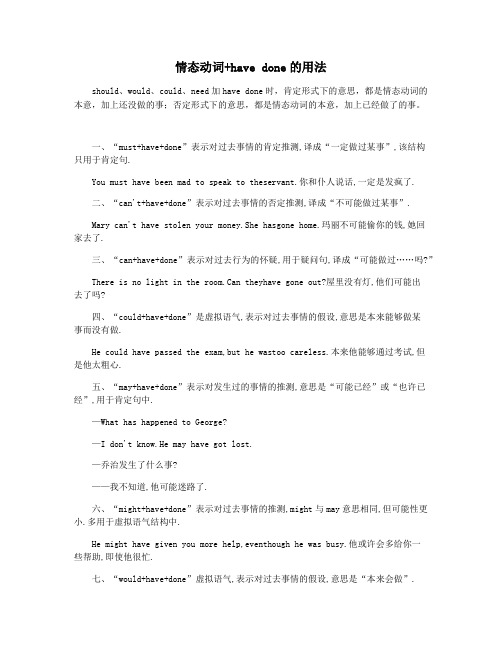
情态动词+have done的用法should、would、could、need加have done时,肯定形式下的意思,都是情态动词的本意,加上还没做的事;否定形式下的意思,都是情态动词的本意,加上已经做了的事。
一、“must+have+done”表示对过去事情的肯定推测,译成“一定做过某事”,该结构只用于肯定句.You must have been mad to speak to theservant.你和仆人说话,一定是发疯了.二、“can't+have+done”表示对过去事情的否定推测,译成“不可能做过某事”.Mary can't have stolen your money.She hasgone home.玛丽不可能偷你的钱,她回家去了.三、“can+have+done”表示对过去行为的怀疑,用于疑问句,译成“可能做过……吗?”There is no light in the room.Can theyhave gone out?屋里没有灯,他们可能出去了吗?四、“could+have+done”是虚拟语气,表示对过去事情的假设,意思是本来能够做某事而没有做.He could have passed the exam,but he wastoo careless.本来他能够通过考试,但是他太粗心.五、“may+have+done”表示对发生过的事情的推测,意思是“可能已经”或“也许已经”,用于肯定句中.—What has happened to George?—I don't know.He may have got lost.—乔治发生了什么事?——我不知道,他可能迷路了.六、“might+have+done”表示对过去事情的推测,might与may意思相同,但可能性更小.多用于虚拟语气结构中.He might have given you more help,eventhough he was busy.他或许会多给你一些帮助,即使他很忙.七、“would+have+done”虚拟语气,表示对过去事情的假设,意思是“本来会做”.Without your help,I wouldn't haveachieved so much.没有你的帮助,我是不会取得如此大的成绩.八、“should+have+done”意思是“本来应该做某事,而实际没做.”“shouldn't+have+done”表示本来不应该做某事,而实际做了.含有指责对方或自责的含意.Look,Tom is crying.I shouldn't have beenso harsh on him.看,汤姆哭了,我本来不应该对他如此严厉.九、“ought to+have+done”表示过去应该做而实际并没有做,译成“理应做……”,往往表示遗憾.与“should+have+done”用法基本一样.I ought to have gone home last Sunday.我理应上星期日回家.十、“need+have+done”表示本来需要做某事而没有做.“needn't+have+done”则表示“本来不需要做某事而做了”.I needn't have bought so much wine—only fivepeople came.我本来没有必要买这么多酒,只来了五个人.感谢您的阅读,祝您生活愉快。
could have done的用法
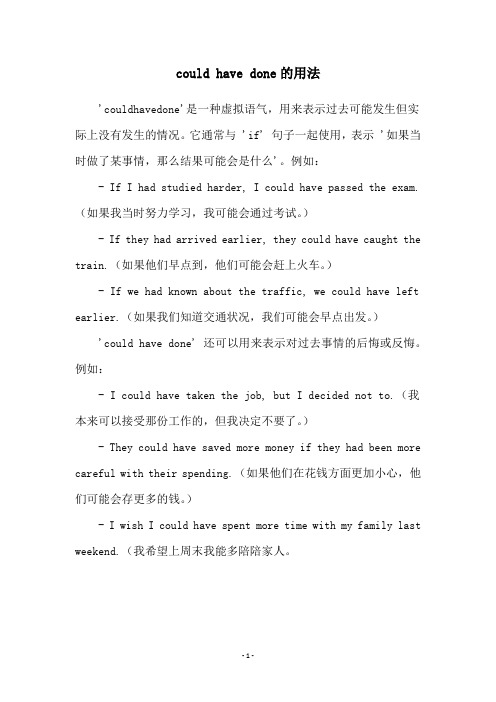
could have done的用法
'couldhavedone'是一种虚拟语气,用来表示过去可能发生但实际上没有发生的情况。
它通常与 'if' 句子一起使用,表示 '如果当时做了某事情,那么结果可能会是什么'。
例如:
- If I had studied harder, I could have passed the exam.(如果我当时努力学习,我可能会通过考试。
)
- If they had arrived earlier, they could have caught the train.(如果他们早点到,他们可能会赶上火车。
)
- If we had known about the traffic, we could have left earlier.(如果我们知道交通状况,我们可能会早点出发。
)
'could have done' 还可以用来表示对过去事情的后悔或反悔。
例如:
- I could have taken the job, but I decided not to.(我本来可以接受那份工作的,但我决定不要了。
)
- They could have saved more money if they had been more careful with their spending.(如果他们在花钱方面更加小心,他们可能会存更多的钱。
)
- I wish I could have spent more time with my family last weekend.(我希望上周末我能多陪陪家人。
- 1 -。
would should could have done用法和区别
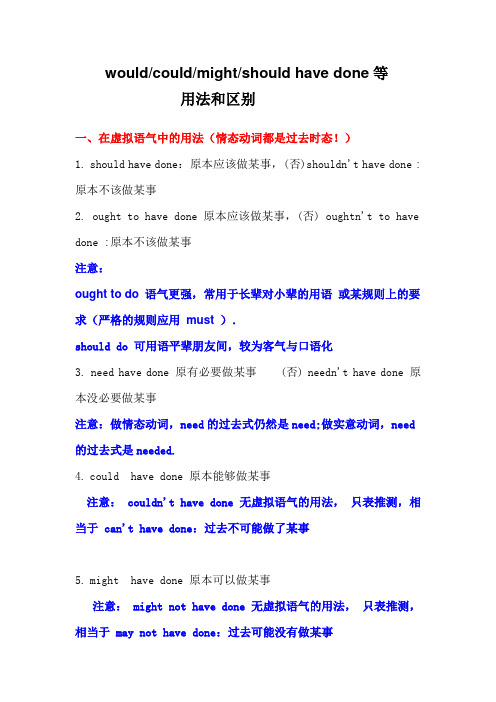
would/could/might/should have done等用法和区别一、在虚拟语气中的用法(情态动词都是过去时态!)1. should have done:原本应该做某事,(否)shouldn't have done :原本不该做某事2. ought to have done 原本应该做某事,(否) oughtn't to have done :原本不该做某事注意:ought to do 语气更强,常用于长辈对小辈的用语或某规则上的要求(严格的规则应用must ).should do 可用语平辈朋友间,较为客气与口语化3. need have done 原有必要做某事 (否) needn't have done 原本没必要做某事注意:做情态动词,need的过去式仍然是need;做实意动词,need 的过去式是needed.4.could have done 原本能够做某事注意: couldn't have done 无虚拟语气的用法,只表推测,相当于 can't have done:过去不可能做了某事5.might have done 原本可以做某事注意: might not have done 无虚拟语气的用法,只表推测,相当于 may not have done:过去可能没有做某事6.would have done原本会做某事1. I would have told you all about the boy's story, but you didn't ask me.二、对过去事情表推测的用法(情态动词用原型或过去式都可以,只是在说话者看来,可能性大小稍微有所不同而已)1. must have done:过去肯定做了某事。
不存在 mustn't have done 的形式。
其否定或疑问形式须用 can(could)have done:“不可能做过某事”来表示:Since the road is wet, it must have rained last night.既然路是湿的,那昨天晚上肯定下雨了。
情态动词+have done的用法+练习

1. It _______________ must have rained (rain) last night, for the ground is wet this morning. 昨天晚上一定是下雨了,因为今晨地面是潮湿的。 have been 2. She didn't attend the lesson then. Shemust ____________(be) ill. 3. Yesterday Jane walked away for discussion, otherwise, she might _____________ have said (say) something she would regret later. 4. It's 8 o'clcok. I am very hungry. You _____________ (cook) should have cooked the dinner. 5. If they had finished the work on time, they ______________________ would have been praised (praise) by the manager. 6. If you had worked hard, you could _______________ have passed the exam. needn't have spent 7. We spent a lot of money that we _____________ (not spend). 8. We went by sea but I'd rather ______________ (go) by air
情态动词+动词不定式完成结构的用法 5. must have done... 一定已经做过了 否定 couldn't/can't have done... 不可能做了 5 needn't have done “本来不必做”(但是已经做过了) 6 would rather have done
情态动词+have done的构成及用法含译文
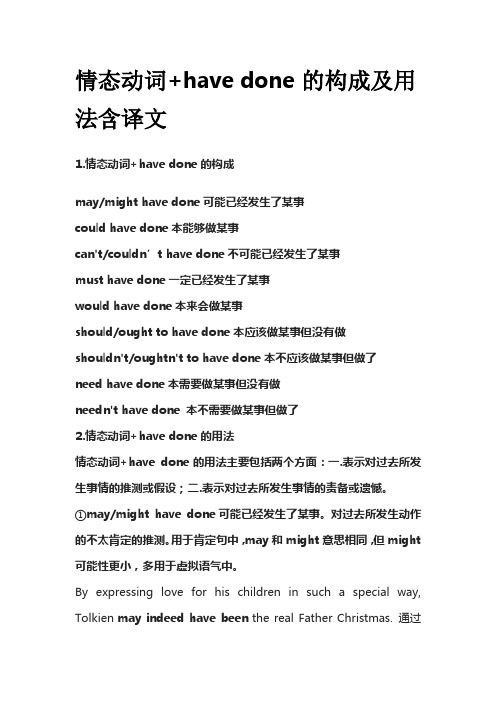
情态动词+have done的构成及用法含译文1.情态动词+have done的构成may/might have done可能已经发生了某事could have done本能够做某事can't/couldn’t have done不可能已经发生了某事must have done一定已经发生了某事would have done本来会做某事should/ought to have done本应该做某事但没有做shouldn't/oughtn't to have done本不应该做某事但做了need have done本需要做某事但没有做needn't have done 本不需要做某事但做了2.情态动词+have done的用法情态动词+have done的用法主要包括两个方面:一.表示对过去所发生事情的推测或假设;二.表示对过去所发生事情的责备或遗憾。
①may/might have done可能已经发生了某事。
对过去所发生动作的不太肯定的推测。
用于肯定句中,may和might意思相同,但might 可能性更小,多用于虚拟语气中。
By expressing love for his children in such a special way, Tolkien may indeed have been the real Father Christmas. 通过这种特别的方式表达对孩子们的爱,托尔金可能真的是真正的圣诞老人。
(新外研版必修二)You can check his office. He might have been there already. 你可以去他的办公室看看。
他可能已经到那儿了。
If he had been given more encouragement, he might have made greater progress. 如果给他更多的鼓励,他可能会取得更大的进步。
英语语法:“情态动词+完成式”的用法
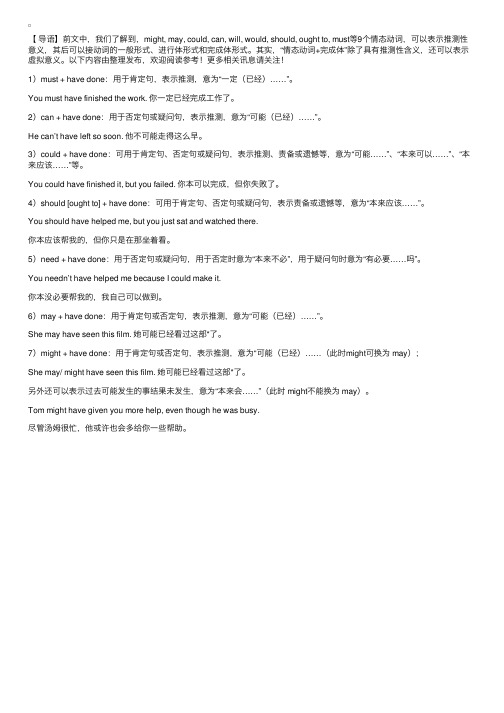
【导语】前⽂中,我们了解到,might, may, could, can, will, would, should, ought to, must等9个情态动词,可以表⽰推测性意义,其后可以接动词的⼀般形式、进⾏体形式和完成体形式。
其实,“情态动词+完成体”除了具有推测性含义,还可以表⽰虚拟意义。
以下内容由整理发布,欢迎阅读参考!更多相关讯息请关注!1)must + have done:⽤于肯定句,表⽰推测,意为“⼀定(已经)……”。
You must have finished the work. 你⼀定已经完成⼯作了。
2)can + have done:⽤于否定句或疑问句,表⽰推测,意为“可能(已经)……”。
He can’t have left so soon. 他不可能⾛得这么早。
3)could + have done:可⽤于肯定句、否定句或疑问句,表⽰推测、责备或遗憾等,意为“可能……”、“本来可以……”、“本来应该……”等。
You could have finished it, but you failed. 你本可以完成,但你失败了。
4)should [ought to] + have done:可⽤于肯定句、否定句或疑问句,表⽰责备或遗憾等,意为“本来应该……”。
You should have helped me, but you just sat and watched there.你本应该帮我的,但你只是在那坐着看。
5)need + have done:⽤于否定句或疑问句,⽤于否定时意为“本来不必”,⽤于疑问句时意为“有必要……吗”。
You needn’t have helped me because I could make it.你本没必要帮我的,我⾃⼰可以做到。
6)may + have done:⽤于肯定句或否定句,表⽰推测,意为“可能(已经)……”。
She may have seen this film. 她可能已经看过这部*了。
考研语法小知识:情态动词+have done

考研英语情态动词+have done的用法共分为9种,分别为:must have done、may/might have done、can/cannot have done、could have done、might have done、should/ought to have done、needn’t have done、had better have done、would rather have done,具体讲解如下: 情态动词+have done 用法 例句 must have done 表示主观上对过去已经发生的行为进行推测,意为“想必,准是,一定做了某事”。
He was subtilized someone must have entered his room.他敏锐地察觉到一定有什么人进过他的房间。
may/might have done 表示对过去已发生行为的推测,意为“也许/或许已经(没有)……”。
一般用于肯定句或否定句中,不用于疑问句。
用might则表示语气更加不肯定。
A radio announcer may have an audience of millions.一个广播员可能拥有数百万名听众。
can/cannot have done 表示对过去发生的行为的怀疑和不肯定,通常用在否定句和疑问句中。
(can换成could时语气委婉) It beats me how she can have done it.我感到莫名其妙,她怎么竟然做出这样的事。
could have done 可用于肯定句中,表示“可能已经……”之意,此外,还可以表示过去能做而没做的事,有一种对过去未付诸实施的事情的惋惜。
Our ancestors could have killed themselves off with their large brains and dangerous memes, but they pulled through.我们的祖先原本可能会因为自己的硕大头脑和危险的模因而灭亡,好在他们挺了过来。
- 1、下载文档前请自行甄别文档内容的完整性,平台不提供额外的编辑、内容补充、找答案等附加服务。
- 2、"仅部分预览"的文档,不可在线预览部分如存在完整性等问题,可反馈申请退款(可完整预览的文档不适用该条件!)。
- 3、如文档侵犯您的权益,请联系客服反馈,我们会尽快为您处理(人工客服工作时间:9:00-18:30)。
could have done 用法详解
1. 表示主观猜测:即对已经发生动作或已经存在的状态作出主观上的猜测,通常可译为“可能(已经)”,有时需根据具体语境来翻译。
如:
Tom could have taken the money; he was here alone yesterday. 有可能是汤姆把钱拿走了,昨天他单独一个人在这里呆过。
We knew he couldn’t have paid for it, because he had no money. 我们知道不可能是他付了这笔钱,因为他没钱。
该用法也可将could换成can,但这只限于否定句和疑问句,因为can表推测时不用于肯定句(而could可以用于肯定句)。
如:
Can he have left already? 他会已经离开了吗?
They can’t have gone out because the light’s on. 他们不可能出去了,因为灯还亮着。
2. 表示未曾实现的能力:即表示过去本来有能力可以做某事的,但实际上没有那样去做,通常译为“本来可以”“本来能力”等。
如:
The worst of it is that I could have prevented the accident. 最糟糕的是我本来可以防止这次事故的。
I could have passed my examination easily but I made too many stupid mistakes. 我本可以轻易通过考试,但我犯了太多不该犯的错误。
有时用于反语。
如:
You’ve broken my pen—thanks for nothing, I could have done that for myself. 你把我的笔给弄坏了——你得了吧,就那我自己也会弄。
3. 表示未实现的可能性:即表示过去本来可能发生情况,而实际上没有发生,通常译为“本来可以”“本来可能”等。
如:
She could have been seriously injured. 她本来可能伤得很重的。
It’s difficult enough, but it could have been worse. 这事情够困难的了,本来可能会更糟呢。
有时也可根据语境译为“好在没有”“差点”,尤其是当谈论的是“不好”的情况时。
如:She felt miserable. She could have cried. 她感到很痛苦,她差点哭了。
Why did you throw the bottle out of the window? Somebody could have been hurt. 你为什么把瓶子扔出窗外呢?好在没有砸伤人。
4. 表示未曾实现的想法:即表示过去本来有做某事的打算或意图,但实际上没有实现,通常译为“本来可以”。
如:
I could have lent you the money. Why didn’t you ask me? 我本来可以借这笔钱给你的。
你为什么不向我提出?
I could have given you some hints, but I suppose you thought yourself too grand. 我本可以给你点提示的,但是我认为你太自负了。
5. 表示未曾实现的选择:即表示过去本来可以有机会选择做某事,但实际上没有那样做,通常译为“本来可以”。
如:
You needn’t have typed it twice. You could have used a carbon. 你没必要打两遍的,你当时本可以用复写纸打。
You needn’t have walked up; you could have taken the lift. 你没必要走着上去,你本来可以乘电梯的。
6. 表示批评或责备:即表示过去本来有责任或义务应该做某事的,但实际上却没有做成,含有批评和责备的意味,通常译为“本来应该”“本来可以”等。
如:
You could have started a little earlier. 你本可早点动身的。
You could have helped me—why did you just sit and watch? 你本来可以帮我一把嘛——为什么你只是坐在那儿观望呢?
7. 表示可能达到的极限:表示即使人们尽力而为去做某事,但还是未能做成,通常用于否定句。
如:
I couldn’t have won, so I didn’t go in for the race. 反正我也赢不了,所以我就没有参加赛跑。
I couldn’t have enjoyed myself more—it was a perfect day. 我玩得没法再痛快了——这一天简直痛快极了。
8. 表示惊讶:表示对所发生的情况感到惊奇,含有“竟然”的意味。
如:
It seems inconceivable that the accident could have happened so quickly. 这一事故发生得这么快,简直不可思议。
Well, I’m blowed! I should never have thought you could have done it. 真想不到! 我从未想到居然办得到。
9. 用于虚拟语气:在虚拟条件句中,当谈论过去的情况时,其句型通常是:主句用“could / would / should /might +have+过去分词”,从句用过去完成时。
如:
If he had known the facts, he could have told us what to do. 如果他了解事实,他是可能告诉我们怎样做的。
If anybody had asked me, I could have told them what happened. 如果有谁问过我,我可以告诉他们发生了什么情况。
10. 用于口语惯用表达:如用于I could have sworn…,表示“我可以发誓”“我千真万确”。
如:
I could have sworn I’d paid that bill. 我可以发誓我付过账。
I could have sworn I heard a knock at the door. 我千真万确听到了敲门声。
